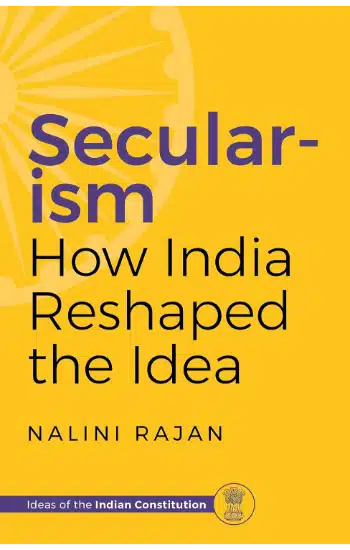Secularism : How India Reshaped the Idea
Publisher:
| Author:
| Language:
| Format:
Publisher:
Author:
Language:
Format:
₹399 ₹339
Save: 15%
In stock
Ships within:
In stock
ISBN:
Page Extent:
Secularism emerged in 17thcentury Europe as an essential element of what became the modern state. The separation of church and state that it entailed paved the way for the democratic republics we take for granted today. Tolerance, as understood in the West, was sought to be introduced as state policy by the British in India too. But our nationalist leaders understood their country better than to adopt the concept without local adjustments. Political philosopher Nalini Rajan examines the tension between religious freedom and state intervention in India, a tension that comes with the idea of ‘principled’ state intervention in matters of religion, as mandated by the Constitution. Demands for reservations and separate electorates by minorities in the early twentieth century had essentially ruled out absolute state neutrality in this respect. But it is only by analysing the fascinating debates on secularism in the Constituent Assembly (1946–49) that we see how and why the specific provisions on minority rights—Articles 25 to 30—came to be adopted. These provisions implicitly envisioned a key role for the judiciary. A full section of this book is thus devoted to understanding the role that the courts have played in establishing, and just as importantly, defining Indian secularism—through such judgements as in the Shirur Mutt case of 1954, the Durgah Committee case of 1961, the Satsangi case of 1966, the Stanislaus case of 1977, the Shah Bano case of 1985, the socalled ‘Hindutva’ cases of 1996, the Vaishno Devi case of 1997, and the Puttaswamy case of 2017. This exhaustive monograph should be read by all those interested in understanding how a distinctive secularism shaped modern India, and how the latter shaped our secularism.
Secularism emerged in 17thcentury Europe as an essential element of what became the modern state. The separation of church and state that it entailed paved the way for the democratic republics we take for granted today. Tolerance, as understood in the West, was sought to be introduced as state policy by the British in India too. But our nationalist leaders understood their country better than to adopt the concept without local adjustments. Political philosopher Nalini Rajan examines the tension between religious freedom and state intervention in India, a tension that comes with the idea of ‘principled’ state intervention in matters of religion, as mandated by the Constitution. Demands for reservations and separate electorates by minorities in the early twentieth century had essentially ruled out absolute state neutrality in this respect. But it is only by analysing the fascinating debates on secularism in the Constituent Assembly (1946–49) that we see how and why the specific provisions on minority rights—Articles 25 to 30—came to be adopted. These provisions implicitly envisioned a key role for the judiciary. A full section of this book is thus devoted to understanding the role that the courts have played in establishing, and just as importantly, defining Indian secularism—through such judgements as in the Shirur Mutt case of 1954, the Durgah Committee case of 1961, the Satsangi case of 1966, the Stanislaus case of 1977, the Shah Bano case of 1985, the socalled ‘Hindutva’ cases of 1996, the Vaishno Devi case of 1997, and the Puttaswamy case of 2017. This exhaustive monograph should be read by all those interested in understanding how a distinctive secularism shaped modern India, and how the latter shaped our secularism.
About Author
Reviews
There are no reviews yet.
Related products
Identity & Survival: Sikh Militancy in India 1978-1993
Save: 20%
The Republic Relearnt: Renewing Indian Democracy 1947-2024
Save: 25%
Fallout: Power, Intrigue And Political Upheaval In Pakistan
Save: 15%
RELATED PRODUCTS
The Republic Relearnt: Renewing Indian Democracy 1947-2024
Save: 25%
Fallout: Power, Intrigue And Political Upheaval In Pakistan
Save: 15%
The RSS: 100 Years of Service, Dedication and Nation Building
Save: 15%
No Land s People: The Untold Story of Assam s NRC Crisis
Save: 67%




Reviews
There are no reviews yet.